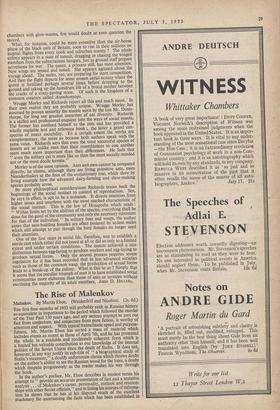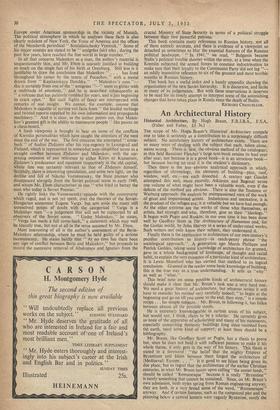The Rise of Malenkov
THE first four.months of 1953 will probably rank in Russian history as equivalent in importance to the period which followed the murder of the Tsar Paul 150 years ago, and any serious attempt to sort out fact from conjecture, and conjecture from pure fiction, is worthy of attention and respect. With typical transatlantic speed and purpose- ' fulness, Mr. Martin Ebon has sorted a mass of material which includes events as recent as those of April 7th, and he has presented the whole in a readable and moderately coherent form which is a limited but valuable contribution to our knowledge of the internal politics of the Soviet Union since the death of Stalin. It does not, however, in any way justify its sub-title of " a biographical study of Stalin's successor," a doubty unfortunate choice which throws doubt on the author's ability to see the Russian wood for the trees, a doubt which deepens progressively as the reader makes his way through the book.
In the author's preface, Mr. Ebon describes in modest terms his attempt to " provide an accurate presentation of fact and a tentative analysis . . . of Malenkov's career, personality, outlook and relation- ships with other Soviet officials," and in listing his sources of informa- tion he shows that he has at his disposal much of the excellent machinery for ascertaining the facts which has been established in Europe under American sponsorship in the vicinity of Munich. The political atmosphere in which he analyses these facts is also clearly redolent of New York, the Voice of America and the offices of the Menshevik periodical " Sotsialistichesky Vyestnik." Some of his major sources are stated to be " emigrees (sic) who, the past few years, have reached the free world in large numer." In all that concerns Malenkov as a man, the author's material is unquestionably thin, and Mr. Ebon is scarcely justified in building so much on the single fact of his birth at Orenburg. Still less is it justifiable to draw the conclusion that Malenkov " . . . has lived throughout his career by the tenets of Pucachov," with a moral drawn from " Kapitanskaya Dotchka." " Malenkov's eyes "- this is certainly from one of the " emigrees "—" seem to glitter with a multitude of emotions," and he is described subsequently as " a volcano that has patiently rumbled for years, and is just beginning to crack open." But such flights of fancy are interspersed with remarks of real insight. We cannot, for example, assume that Malenkov is capable of sorting out facts from " the loaded verbiage and twisted reports supplied by his own information and propaganda machinery." And it is clear, as the author points out, that Malen- kov 's greatest gift is the ability to manoeuvre people " like pawns on a chess-board."
A fresh viewpoint is brought to bear on some of the conflicts of Kremlin personalities which have caught the attention of the west since the end of the war. The first concerns the attempted come- back " of Andrei Zhdanov after his vice-regency in Leningrad and Finland, which is represented in somewhat over-simplified terms as a straight conflict between Zhdanov and Malenkov, with the sur- prising omission of any reference to either Kirov or Kuznetsov, Zhdanov's predecessor and successor respectively in the old capital, whose fate was certainly relevant to that of Zhdanov himself. Secondly, there is interesting speculation, and some new light, on the decline and fall of Nikolai Voznessensky, the State planner who disappeared abruptly from the Soviet political scene in early 1949, and whom Mr. Ebon characterises as one " who tried to betray the man who today is Soviet Premier." He rightly links the Voznessensky•episode with the controversy which raged, and is not yet spent, over the theories of the Soviet- . iungarian economist Eugene Varga, but sets aside the many still unresolved points of doubt with the categorical " Varga is a Malenkpv man "—a judgement that will not be supported by all observers of the Soviet scene. " Under Malenkov," he states, " Varga has made a full come-back," a statement which may well be literally true, but not at all in the sense assumed by Mr. Ebon. Most interesting of all is the author's assessment of the Beria- Malenkov relationship, where he must be held guilty of a serious inconsistency. He states baldly that " At no time has there been any sign of conflict between Beria and Malenkov," but proceeds to record the successive removal of Abakumov and Ignatiev from the crucial Ministry of State Security in terms of a political struggle between their two powerful patrons.
This book contains many references to Russian history, not all of them entirely accurate, and there is evidence of a viewpoint so detached as sometimes to blur the essential features of the Russian political landscape. " In 1941," we read, " Bulganin became Stalin's political trouble shooter within the army, at a time when the Kremlin subjected the armed forces to constant indoctrination to make sure that their loyalty to the Communist Party did not lag "- an oddly insensitive reference to six of the greatest and most terrible months in Russian history. This book has a useful index and a handy appendix showing the organisation of the new Soviet hierarchy. It is discursive, and facile in many of its judgements. But with these reservations it deserves to be read for its timely attempt to interpret some of the astonishing changes that have taken place in Russia since the death of Stalin.
RICHARD CHANCELLOR.



























































 Previous page
Previous page